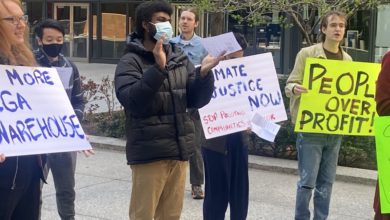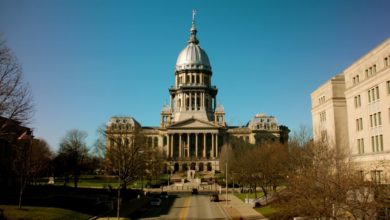On Aug. 1, the Illinois Commerce Commission held a public hearing on Peoples Gas’ proposed rate hike at the University of Illinois Chicago. After Peoples Gas executives laid out their plan and reasoning for the rate hike, several Chicago-based nonprofits, organizing groups and residents lambasted the company for its mismanagement and corporate greed.
While Chicagoans are failing to pay bills and make ends meet, Peoples Gas has failed to meet its own deadlines for infrastructure updates. Now, after the threats of gas shut-offs and late fees have enabled Peoples Gas to have yet another year of record profits, they are proposing to expense the rest of the infrastructure project by increasing the average residential bill by $11.83 a month starting in January.
Peoples Gas’ proposed rate hike
Peoples Gas opened the hearing by positioning themselves as core to what it means to be Chicagoan. The company’s vice president of operational performance and compliance, Polly Eldringhoff, explained to the crowd, “We helped rebuild this city after the [Great Chicago] fire, and we have helped grow and redevelop every neighborhood in this city.”
Collectively, Peoples Gas’ opening comments were meant to deter critiques that the utility company is further exploiting working people. On the contrary, the utility framed itself as experiencing hardship despite record profits. Peoples Gas’ Director of Regulatory Policy and Local Government Affairs Tom Aridas, lamented, “Like anyone in this room who’s seen the rising costs in groceries, fuel to drive trucks or monthly rents, we too have seen rising costs.”
Aridas argued that the increase in monthly bills would be offset by the continued decrease in natural gas prices across the United States. However, the consumer watchdog group Illinois PIRG notes that the current projections for falling natural gas prices in 2024 are not guaranteed, but are instead simply forecasts based on the best information available at the time.
What is known though is that Peoples Gas has continued to make record profits for multiple years. Peoples Gas made $208 million in profits in 2022, building on increasing profits for the sixth year in a row. Its parent company, WEC Energy Group, made $1.4 billion in profits in 2022. The proposed rate hike would rake in another $402 million for the company on top of this.
Working-class Chicagoans demand ‘No rate hike!’
While Peoples Gas argued that the rate hike would only increase monthly bills by $11.83, if at all, working-class Chicagoans argued that even this “small” increase would only further exacerbate disparities in access to energy and utilities across the city.
Lilly Scales, state director of the Illinois Clean Jobs Coalition, spoke at the forum, noting that “10 Chicago zip codes, all majority Black, accounted for 50% of Peoples Gas disconnections this summer” alone.
Ivonne Rychwa, outreach director for the Citizens Utility Board said, “I have talked to thousands of Chicagoans upset about their monthly bills. Peoples Gas wants the highest rate hike in Illinois history … In Englewood [a majority Black, working-class neighborhood], more than 40% of residents are behind on their bills. Think how bad it could get in the winter if this rate hike is approved.”
While almost one in five Chicagoans are behind in paying their bills, the majority of gas disconnections occur in predominantly Black communities. The Chicago Sun-Times notes that the rate of disconnections is three times higher in predominantly Black, Indigenous and Latino communities compared with predominantly white communities. An increase of $11.83 per month would only further increase the number of working-class Chicagoans of color already going without gas throughout the harsh Midwest winters.
Others in attendance, like community member Mohammed Patel, argued that it is ridiculous to allow utility monopolies contracting with local or state governments to bring in the same profits that other companies would on the stock market. Patel told the ICC, “They are asking for a rate increase in their return on equity for 9.05% to 9.9%. The expected rate of return on the stock market is 10% … We should not be expecting them to make the average expected amount in the stock market.”
For elderly residents, this expectation for Peoples Gas to continue earning the same as other competitors is particularly harrowing. Phillippe Largent, representing the Illinois AARP, explained to the ICC that retired community members live on fixed budgets. Increasing their monthly bills would mean forgoing other necessary expenses. “No one should have to choose between buying groceries and heating their homes, but that’s what’s happened to countless seniors in Chicago,” he said.
Rebuilding gas infrastructure during a climate crisis
In 2011, Peoples Gas began a $2 billion infrastructure update in Chicago, replacing outdated iron pipes with new plastic pipelines by the year 2030. Now, over a decade later, the customer-funded project isn’t even close to complete. Aridas stated that, “over 80% of the iron pipes are nearing” the end of their usage. Meanwhile, the estimated timeline has shifted to 2040 with estimated costs shifting to $8 billion. However, Crain’s Chicago Business suggests that the actual figure will be close to $11 billion with a completion date of 2048.
To take a step back, natural gas is often promoted as a more efficient and clean form of energy. Peoples Gas’ slogan is “Creating a bright, sustainable future.” But burning natural gas emits methane, a powerful greenhouse gas and air pollutant. Methane emissions from natural gas production continue to be about a third of all methane emissions in the United States year-to-year, while methane emissions themselves account for 30% of the rise in global temperatures since the beginning of the industrial era.
Peoples Gas continues to spend exorbitant amounts of money on an infrastructure update while they are continuously failing to deliver an accurate timeline. In the meantime, methane emissions from natural gas are killing the planet, and this infrastructure update would only serve to deepen our dependence on fossil fuels. As another attendee, Pastor Scott Onque of St. Luke Missionary Baptist Church, put it, “Why spend money on the backs of the least to build an infrastructure at the end of its life?” Instead of updating eroding fossil fuel infrastructure and increasing our investment in greenhouse gases, the city of Chicago needs to deliver and support the transition to a green economy.
Increasing costs to working people
While Peoples Gas argues that the rate hike is necessary at a time of crumbling infrastructure, the people are not to blame for the city and the country’s ongoing disinvestment in necessary infrastructure. Peoples Gas already includes a mandatory “qualified infrastructure plant” charge on every monthly gas bill. This charge is meant to be used to replace old pipes with new ones, but Crains Chicago Business notes that Peoples Gas has failed to replace more than 60 miles of pipe on average per year since 2018.
Peoples Gas is not alone in its increasing costs to working people. Electric utility ComEd proposed a new rate hike that will be ruled on in November, and could possibly take effect January 2024. The rate hike increases working people’s electricity bills incrementally to a total of $17 per month extra by 2027, according to WGNTV.
ComEd similarly justifies the rate hike as a necessity for infrastructural maintenance and improvement required by government regulation. CUB notes that ComEd’s former CEO is currently on trial for attempting to bribe former speaker of the Illinois House of Representatives Mike Madigan for political favors that brought in a billion dollars of rate hikes in the past decade. Within the proposal, ComEd also asked for an increase of return on equity — the amount they pay out to shareholders — jumping from 7.85% to 10.5%, eventually increasing to 10.65% by 2027. ComEd and Peoples Gas, as well as electric and gas utility Ameren Illinois, Nicor Gas and North Shore Gas, are all proposing rate hikes this year. This could result in a record total of $2.9 billion in utility rate hikes in Illinois, according to the Journal-Courier.
A real solution
For years, the U.S. capitalist class has failed to invest in the ongoing maintenance and development of new infrastructure. From New York City to Boston to Chicago, the United States’ energy infrastructure has been neglected and is in dire need of updates. However, simply increasing the profits of utility companies will not bring the solutions people need.
We need to force privately owned utilities to replace old infrastructure out of their exorbitant profits, eliminate the profit motive and make gas distribution in Chicago a publicly owned utility, make natural gas free and accessible to all until a transition to sustainable energy is possible, and end fossil fuel use as soon as possible.
Only through a mass movement for a new system can we guarantee that working people are prioritized over the demands of profits.
Feature photo: Tom Aridas, Director of Regulatory Policy and Local Government Affairs at Peoples Gas, addresses a public hearing on the utility’s proposed rate hike, Aug. 1. Liberation photo





